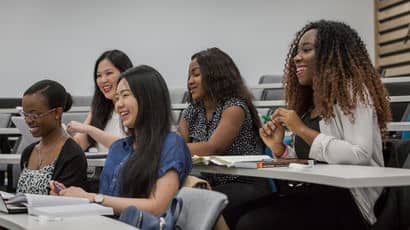How to be an ally to global majority students
Our diverse community
Students from global majority backgrounds often face unique systemic challenges. These can impact their academic performance and overall wellbeing while at university. We're working to address these issues and there are also things students can do to support.
Good to know
Global majority is a collective term that refers to people who are black, Asian, brown, mixed heritage, indigenous to the Global South and/or are not racialised as white.
Why we use the term global majorityWhat you can do
Speak up
Discrimination – both overt and subtle – remains an issue and we recognise that some students will experience harassment and/or bullying during their time at university. Any type of harassment, assault, and discrimination will not be tolerated. We need you to speak up if you see or hear something that's not right, and to be an active bystander.
Report and Support is an online platform where you can report hate incidents and get practical support and guidance.
Acknowledge racism exists
It's important to acknowledge that people from global majority backgrounds still experience prejudice and discrimination. Acknowledging that racism exists is the first step toward creating positive change and creating a university environment that is fair and inclusive for everyone.
By understanding these issues, you can actively work to challenge biases, support your peers, and promote an atmosphere where global majority students feel respected and valued.
Understand your privilege
You may have heard the term white privilege. It refers to the way skin colour can either offer unearned advantages or simply mean that race isn’t a barrier in certain situations. This concept highlights the systemic advantages that white people often experience compared to people from the global majority.
White privilege doesn’t mean life has been easy or free from hardship. It means that race hasn’t added to those challenges. Privilege doesn’t erase personal struggles, but it does mean there are certain obstacles people may not have faced because of ethnicity.
Recognising privilege is not about guilt; it's about awareness. By understanding systemic inequalities, you can use that awareness to support and advocate for a fairer, more inclusive society — one where everyone has equal access to opportunity.
Creating an anti-racist environment
Find out what anti-racism is and what steps you can take to help create an inclusive culture.
Anti-racism at UWE BristolLet’s learn about it
Take time to learn about the experiences, challenges, and histories of global majority students. Attend workshops, read books, and listen to lived experiences of those who have faced discrimination. Don't ask people from marginalised backgrounds to educate you — we can all take responsibility for this ourselves.
- Complete the Union Black Anti-Racism training, an online course that explores black British history, cultures and steps to anti-racism. There's a one-hour primer and a six-hour full course available.
- Have a conversation with someone about their lived experiences and reflect on how they may differ from your own.
- Use the Library's collection of film, audio and books to find out more about Black History.
Make a difference
There are many things you can do that will make an impact and help to improve university life for everyone.
- Use our Report and Support tool if you've experienced something on campus or on university business that makes you feel upset or uncomfortable.
- Join the Speak Up student society. For more information, please email our Equity, Diversity and Inclusion team at edi@uwe.ac.uk.
- Engage with our Black History Month events.
Support resources
If you're a global majority student, you may find the following support resources helpful.
- Nilaari is a local black, Asian and minority ethnic-led charity with therapists delivering support, talking therapies and workshops for students experiencing the rigours of university life.
- Bristol Hate Crime + Discrimination Service is a partnership of six organisations aiming to offer a complete service for victims of hate crime and discrimination within Bristol.
- Bristol Mind specialises in mental health casework, which means they can support you if you have experienced hate as a result of your mental health, and/or if your mental health has suffered because of other forms of hate crime and discrimination.
- SARI (Stand Against Racism & Inequality) provides free and confidential support to anyone who is targeted by hate for their race, faith, disability, sexual orientation, transgender identity, age, gender or sex.
You may also be interested in

Bristol Allies
Creating allyship in our community. We want to make sure that every student feels like they belong at UWE Bristol.

Supporting Global Majority students
Support services and resources for students who identify as Global Majority.

Speak Up
We want to create an inclusive campus where antisocial attitudes and behaviours are challenged. If a situation doesn't feel right, Speak Up.
